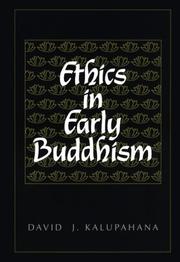Check nearby libraries
Buy this book

Throughout the centuries, moral philosophers, both Eastern and Western, considered a permanent and eternal law a necessary requirement for the formulation of a moral principle. If such a law was not empirically given, it had to be determined through reason. In contrast, early Buddhism presented a radical theory of impermanence.
Interpreters of early Buddhism have been unable to abandon the presupposition of permanence, however, and hence have persisted in viewing nirvana or freedom as a permanent and eternal state to be contrasted with the impermanent world of sensory experience and bondage. Ethics in Early Buddhism is David J.
Kalupahana's balanced and brilliantly concise attempt to place the early Buddhist descriptions of the world of experience, the state of freedom, and the moral principle leading to such freedom within the framework of impermanence.
Check nearby libraries
Buy this book

Previews available in: English
Subjects
Doctrines, Buddhism, Buddhist ethics, History, Buddhism, doctrines| Edition | Availability |
|---|---|
| 1 |
aaaa
|
Book Details
Edition Notes
Includes bibliographical references (p. 163-166) and index.
Classifications
The Physical Object
ID Numbers
Community Reviews (0)
Feedback?| August 17, 2024 | Edited by ImportBot | import existing book |
| July 18, 2024 | Edited by MARC Bot | import existing book |
| April 28, 2010 | Edited by Open Library Bot | Linked existing covers to the work. |
| January 15, 2010 | Edited by WorkBot | add subjects and covers |
| December 9, 2009 | Created by WorkBot | add works page |









